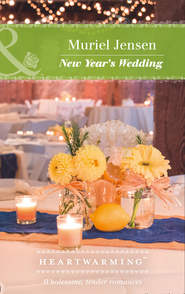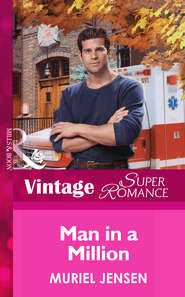По всем вопросам обращайтесь на: info@litportal.ru
(©) 2003-2025.
✖
His Wedding
Автор
Год написания книги
2018
Настройки чтения
Размер шрифта
Высота строк
Поля
“You’re not going to measure up?” he said in disbelief. “That’s ridiculous. You always behave as though—”
She interrupted with a swipe of her cookie in the air. “It’s an act. I’m just afraid that one day I’m going to do something embarrassing to them.”
“Get a grip, Janet,” he said. “They’re not royalty. They’re just wealthy people who are socially well connected.”
She gave him a dry look. “If I may quote you, ‘Easy for you to say.’ You grew up in their world. Your parents had the same standard of living, the same social connections. You know how to behave among all this—” She raised a finger to stop him when he would have interrupted her. “Yes, you have that scandalous background.” She enunciated the word with a dramatic waggle of her eyebrows. “But people deal so much more on perception than they do fact. All people notice is that you behave like a gentleman, that you’re well-spoken and well educated. Columbia, wasn’t it?”
“Yes. I went to Columbia.”
“I went to Las Manzanas Community College and Columbia River College.”
“Doesn’t education depend on the thirst for knowledge in the student, rather than on where he goes to school?”
“I don’t imagine my brothers’ Ivy League educated friends would believe that.”
He studied her with a frown. “I think you have some reverse snobbery at work here.”
She smiled innocently. “Why? You’re convinced everyone’s going to judge the Abbotts by the unfortunate circumstances of your birth.”
He continued to frown, and she couldn’t decide if he was out of arguments or out of patience. She considered it a good time to make her point.
“I’ve been asked to be Campbell and China’s maid of honor,” she said, sipping her coffee, “and I don’t have the luxury of refusing them. China’s my only sister and I’m hers.” She paused on the chance he wanted to comment. He didn’t.
“So friends and family are coming from far and wide to this wedding of the year, and I have to be part of the party and take my chances that I won’t do or say something inappropriate among all those people and with all the press bound to be there. Word is the New York Times is sending someone.”
She bit into her cookie, avoiding his eyes. Was she overdoing it? She couldn’t tell. And for a usually straightforward man, he was a master at hiding what he was thinking when he wanted to.
She ate the last bite of her cookie, chewed and swallowed, buying time.
“But if you were best man,” she added, putting her cup down and dusting off her hands, “I’d feel less intimidated. You can help me during the Mass. I wasn’t raised Catholic and I’m not familiar with the ritual, but you are, right?”
“My mother took me to church when I was a child, but I haven’t been in a long time. I don’t think your brothers have, either.”
“At least you have some experience. I won’t know whether to stand or sit or kneel, but you’ll be beside me. You can give me a high sign. You can provide moral support during the reception, and I can deflect the reporters away from you. We’ll help each other.”
HER ARGUMENTS WERE very transparent. The Mass could be confusing to the uninitiated, and it was true that the congregation sat behind the wedding party, so it wasn’t possible to follow their lead in sitting, standing, kneeling unless you turned around to see what they were doing—and that would be just the faux pas she seemed so worried about.
But Sophie, Sawyer’s fiancée, knew the ritual; she sang in the choir at St. Paul’s. Following her lead would be easy enough.
And he couldn’t remember ever seeing Janet make a misstep despite her insistence that Abbott society was unfamiliar to her.
He could only deduce that she was laying it on a little thick because she was determined that her sister and her brother have the wedding they wanted, and that included him.
And, though he disliked admitting this to himself, he found it hard to refuse the appeal in her wide brown eyes. Even knowing it was as much performance as sincere emotion, he was going to let it reel him in. Undoubtedly, he would hate himself for this later.
“All right,” he said.
She blinked at him. “You mean…you’ll do it?”
“Yes.”
“But…why?”
“Because you’re so persuasive.” And, he added silently to himself, I’m a self-indulgent idiot.
He rested one hand on his knee and she closed both hers over it as she beamed at him. “Thank you, Brian.” Her gratitude did sound heartfelt, and her hands on his knee, even over his hand, had a very pleasant effect on his body. “They’ll be so happy.”
“Well, that’s what we want.”
The bell rang over the front door. “Excuse me,” he said, getting to his feet. “Customer.”
Another came in before he was finished with the first, and before he knew it, the place was suddenly hopping.
When he turned to see if everyone had been helped, he found Janet trying to reach something on a top shelf for an older woman who watched her in concern. Brian recognized the woman as a three-or-four-times-a-week customer for most of August and September.
Janet’s body was stretched to its utmost, her heels off the floor, her calves and her bottom in the shorts tight with her effort. He could have watched her in that pose for a while, but he hurried to lend a hand.
“What are you after, Mrs. Lindell?” he asked.
She pointed to the back of the shelf. “That bottle of hair gel.”
He caught it off the shelf and handed it to Janet. She gave it to the woman, who already had a helmet of hair that looked as though it wouldn’t move in a class five hurricane. It was carved into a curled and flipped style he remembered his mother wearing twenty-five years ago.
“Is that the right brand?” Janet asked helpfully.
“That’s it exactly!” The woman gave Janet a ten-dollar bill. “I was sure you were out of it! You wouldn’t believe what a sailboat can do to a hairdo.” To Brian she said, “I’m glad to see you’ve gotten yourself another assistant. She’s more attentive than that boy you just hired. The last time I was here, he was so engrossed in an argument he was having with a girl he didn’t even notice me.”
“I’m sorry.” That was unwelcome news. Joe Fanelli was young, but he’d been so eager for the job. Part of the reason Brian had hired him was that his grandfather owned and operated Fulio’s, the best restaurant in Lost-hampton, known for its attention to detail and customer service. Joe had worked for him after school and during summers, and Brian was sure Fulio insisted on a work ethic at least as strong as his own.
Janet passed him the ten and the three of them went to the cash register. He made the woman change and put her purchase in a bag. “Thank you for telling me,” he said. “I promise that won’t happen to you again.”
“Thank you.” She took her change and chatted on about the dearth of cheerful and dependable retail help while she opened her wallet, dropped the change into the right compartment, then closed it and moved several things around in her purse so that she could put the wallet back in.
Then she picked up the bag and patted Janet’s cheek with her free hand. “You’ll go far, sweetie. The consumer likes a convenient place to shop and a helpful staff. My husband owns four delicatessens. I know what I’m talking about.”
She winked at Brian. “Bye, now.”
Brian watched her walk away, hoping he wouldn’t have to fire Joe Fanelli.
“I think I know what Joe’s problem is,” Janet said, leaning a hip against his counter.
That surprised him. “I wasn’t aware you knew him?”
“I don’t. But I heard the ladies at the beauty shop talking about him when I had my hair trimmed just before I left for L.A.”
“And?”
“And,” she said gravely, “his girlfriend is pregnant. That’s why he’s put off college for a year. Her parents are furious at both of them. His parents are angry at him. Even the girlfriend wants him to go to school. She’s insisting she’ll get a job and raise the baby and wait for him to graduate. He wants to get married and assume his responsibilities.”











